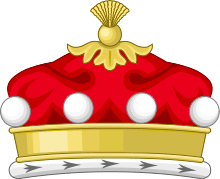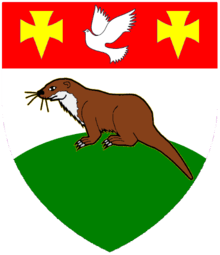John Coleridge, 1st Baron Coleridge
John Duke Coleridge, 1st Baron Coleridge, Kt PC (3 December 1820 – 14 June 1894) was an English lawyer, judge and Liberal politician. He held the posts, in turn, of Solicitor General for England and Wales, Attorney General for England and Wales, Chief Justice of the Common Pleas and Lord Chief Justice of England.
The Lord Coleridge | |
|---|---|
Lord Coleridge by Eden Upton Eddis | |
| Lord Chief Justice of England | |
| In office 29 November 1880 – 14 June 1894 | |
| Monarch | Queen Victoria |
| Preceded by | Sir Alexander Cockburn, Bt |
| Succeeded by | The Lord Russell of Killowen |
| Chief Justice of the Common Pleas | |
| In office November 1873 – 20 November 1880 | |
| Monarch | Queen Victoria |
| Preceded by | Sir William Bovill |
| Succeeded by | Himself as Lord Chief Justice of England |
| Attorney General for England | |
| In office 10 November 1871 – 20 November 1873 | |
| Monarch | Queen Victoria |
| Prime Minister | William Ewart Gladstone |
| Preceded by | Robert Collier |
| Succeeded by | Henry James |
| Solicitor General for England | |
| In office 12 December 1868 – 10 November 1871 | |
| Monarch | Queen Victoria |
| Prime Minister | William Ewart Gladstone |
| Preceded by | Sir Richard Baggallay |
| Succeeded by | Sir George Jessel |
| Personal details | |
| Born | John Duke Coleridge 3 December 1820 Ottery St Mary, Devon United Kingdom |
| Died | 14 June 1894 (aged 73) Westminster, London United Kingdom |
| Nationality | United Kingdom |
| Political party | Liberal |
| Spouse(s) | Jane Fortescue Seymour Amy Augusta Jackson Lawford (1885–1894) |
| Relations | John Taylor Coleridge (Father) |
| Children | Bernard Coleridge Stephen Coleridge 1 Other Son 1 Daughter |
| Alma mater | Eton College Balliol College, Oxford |
| Occupation | Barrister, Politician |
Background and education
Coleridge was the eldest son of John Taylor Coleridge, and the great-nephew of the poet Samuel Taylor Coleridge. He was educated at Eton and Balliol College, Oxford, and was called to the bar in 1846.
Coleridge was a member of the Canterbury Association from 24 June 1851.[1]
Legal career
Coleridge established a successful legal practice on the western circuit. From 1853 to 1854 he held the post of secretary to the Royal Commission on the City of London.[2] In 1865 he was elected to the House of Commons for Exeter for the Liberal Party. He made a favourable impression on the leaders of his party and when the Liberals came to office in 1868 under William Ewart Gladstone, Coleridge was appointed Solicitor-General. In 1871 he was promoted to Attorney-General, a post he held until 1873. In 1871 he was also involved in the high-publicity Tichborne Case.
In November 1873 Coleridge succeeded Sir William Bovill as Chief Justice of the Common Pleas, and in January the following year was raised to the peerage as Baron Coleridge, of Ottery St Mary in the County of Devon. In 1880 he was made Lord Chief Justice of England on the death of Sir Alexander Cockburn. Despite his health failing towards the end of his life he remained in this office until his death. In 1873 he was described by the Manchester-based Women's Suffrage Journal as a "firm and consistent" supporter of women's suffrage.[3]
Family
Lord Coleridge married Jane Fortescue Seymour, daughter of the Reverend George Seymour of Freshwater, Isle of Wight, herself an accomplished artist who notably painted John Henry Newman. They had three sons and a daughter. His first wife died in February 1878. He remained a widower until 1885 when he married Amy Augusta Jackson Lawford, who survived him. Lord Coleridge died in June 1894, aged 74, and was succeeded by his eldest son Bernard John Seymour, who later became a Judge of the High Court of Justice. His second son Stephen also became a barrister. His daughter Mildred eloped with the lawyer Charles Warren Adams, to whom she was married in 1885. This led to two celebrated libel actions won by Adams while Coleridge was serving as lord chief justice.[4]
Leading cases and judgements
- R v Coney (1882)
- R v Dudley and Stephens (1884)
- Gordon-Cumming v Wilson and Others (1891), the trial arising from the Royal Baccarat Scandal.
Arms
  |
|
References
- Blain, Rev. Michael (2007). The Canterbury Association (1848-1852): A Study of Its Members' Connection (PDF). Christchurch: Project Canterbury. pp. 22–23. Retrieved 20 March 2013.
- "List of commissions and officials: 1850–1859 (nos. 53–94)". Office-Holders in Modern Britain: Volume 9. 1984. Retrieved 10 March 2008.
- "Election Intelligence". Women's Suffrage Journal. 1 December 1873. Retrieved 8 February 2018.
- ODNB entry on Coleridge, John Duke, first Baron Coleridge by David Pugsley. Retrieved 16 December 2012. Pay-walled.
- Debrett's Peerage. 1878.
- ^ A short notice of her by Dean Church of St Paul's was published in The Guardian, and was reprinted in her husband's privately printed collection of poems.

External links
| Wikiquote has quotations related to: John Coleridge, 1st Baron Coleridge |
| Wikimedia Commons has media related to John Coleridge, 1st Baron Coleridge. |
- Works by or about John Coleridge, 1st Baron Coleridge at Internet Archive
- Hansard 1803–2005: contributions in Parliament by Lord Coleridge
- "Archival material relating to John Coleridge, 1st Baron Coleridge". UK National Archives.

- John Duke Coleridge, Baron Coleridge at Library of Congress Authorities, with 12 catalogue records
| Parliament of the United Kingdom | ||
|---|---|---|
| Preceded by Richard Sommers Gard Viscount Courtenay |
Member of Parliament for Exeter 1865–1873 With: Viscount Courtenay 1865–1868 Edgar Alfred Bowring 1868–1873 |
Succeeded by Edgar Alfred Bowring Arthur Mills |
| Political offices | ||
| Preceded by Sir Richard Baggallay |
Solicitor General 1868–1871 |
Succeeded by Sir George Jessel |
| Preceded by Sir Robert Collier |
Attorney General 1871–1873 |
Succeeded by Sir Henry James |
| Legal offices | ||
| Preceded by Sir William Bovill |
Chief Justice of the Common Pleas 1873–1880 |
Succeeded by (office abolished) |
| Preceded by Sir Alexander Cockburn |
Lord Chief Justice of England 1880–1894 |
Succeeded by Lord Russell of Killowen |
| Peerage of the United Kingdom | ||
| New creation | Baron Coleridge 1874–1894 |
Succeeded by Bernard John Seymour Coleridge |